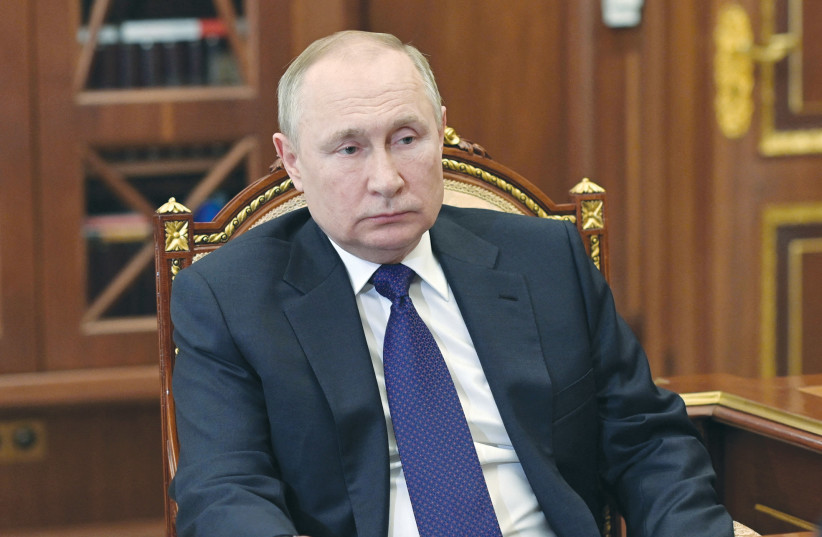There are many lessons to be learned from Russia’s invasion of Ukraine. Among the most glaring is this: Take autocrats at their word – they mean what they say.
Politicians and pundits around the world expressed astonishment that Russian President Vladimir Putin dared send the tens of thousands of troops he amassed on Ukraine’s borders into the country in a full-scale invasion.
Some thought that this massive build-up was just a bluff: that Putin just wanted to get the West’s attention and express how deeply distressed he was at Ukraine’s westward tilt and the prospect of it actually joining NATO.
But to invade another country, one in the heart of Europe, and this being the 21st century? He wouldn’t dare – he’s not that crazy.
Well dare he did, and no one who has listened to what he said on this matter over the last 20 years should have been surprised. Putin made it no secret that he was pained by the outcome of the Cold War, with the West holding the upper hand and Russia very much diminished.

He said so on numerous occasions, most famously in 2005 when he told the Russian parliament that “the demise of the Soviet Union was the greatest geopolitical catastrophe of the century.” He termed this a “genuine tragedy” for the Russian people, and it was clear from his words then and afterward that it was a tragedy he was determined to overturn.
Nor has Putin ever hidden what he really thinks about Ukraine, spelling out in a massive article he wrote last year that the Ukrainians and Russians are one, and that the separation between them is an artificial one fostered by outside powers intent on harming Russia.
It is difficult reading that article to escape the feeling that Putin views himself as the last great “gatherer of Russian lands,” and that he feels it his historic duty to reunite Ukraine, Belarus and Russia to revive past glory. Not the glory of the Soviet Union – Putin is no great Lenin lover – but rather of imperial Czarist Russia.
Putin’s intentions were clear for all to see, but few wanted to see them. Why? Because to see his intentions would mean having to act against them, and to do that would mean confronting Putin and Russia. And who wanted that?
So people closed their ears to what the Russian leader said about the breakup of the USSR, and shut their eyes to what he wrote about Ukraine. The Ukrainians are now paying the price for that mistake.
The world needs to learn from that, and do so quickly, with the first place to implement that lesson being Iran. Like Putin, the Iranians have – through actions and rhetoric – made no secret of their designs: regional hegemony and the erasure of Israel from the map.
Regarding their designs on regional hegemony, just look at what they have done, through their proxies to Iraq, Yemen, Syria and Lebanon. And as to what they have in store for Israel, their leaders over the years have made it abundantly clear.
The examples are too numerous to cite. Just consider this representative tweet from Supreme Leader Ayatollah Ali Khamenei in 2018: “Our stance against Israel is the same stance we have always taken. Israel is a malignant cancerous tumor in the West Asian region that has to be removed and eradicated: It is possible and it will happen.”
While much of the world hears those words and thinks it is just rhetoric, and that – like Putin – he can’t mean it, Israel takes those words and threats very much to heart. This explains why it has so strongly opposed any agreement with Iran that does not strip it completely of the capacity to develop nuclear arms.
As Defense Minister Benny Gantz said Monday upon announcing that the IDF intercepted two Iranian UAVs laden with weapons en route to Gaza last year: “Today Iranian aggression is conducted without a ‘nuclear umbrella’. If Iran reaches a nuclear threshold, it will become even more dangerous to world peace.”
Israel is paying attention to what Khamenei does and says, and is taking steps to try and thwart his malevolent designs. If only the world, fresh off the Ukrainian experience, would now do the same.
